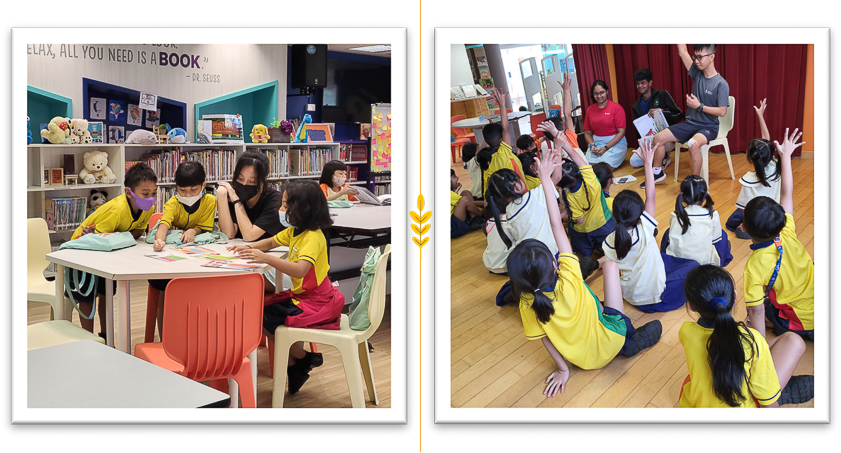English Language
Curricular Goals:
We aim to develop students to be effective and confident communicators by cultivating a rich environment to develop reading, writing, listening and speaking skills.
Taking reference from the EL Syllabus 2020, we want our students to be empathetic communicators, discerning readers and creative inquirers.
We do this by encouraging them to:
- Listen actively to multiple perspectives
- Read a variety of print and non-print texts
- Communicate effectively and sensitively in both verbal and written form
- Process verbal and written information critically and with discernment
Overview:
We make use of STrategies for English Language Learning And Reading (STELLAR) to help our students become proficient users of the English Language.
Under STELLAR 2.0, there is a greater emphasis on helping students develop:
- multiliteracies
- appreciate the changing nature of texts and their purposes
- raise awareness of text features and text organization for various text types
- metacognition
- acquire and use information critically
- monitor and reflect on one’s own thinking
- inquiry through dialogue
- interact, discuss and build on each other’s ideas
Department Strategies
Here are some of the strategies we adopt for the teaching and learning of skills
| Language Area | Strategies |
| Reading | Shared Book Approach, Supported Reading, Know-Want to Know- Learnt (KWL), Retelling |
| Listening | Annotation and taking down of notes |
| Speaking | Respond-Elaboration-Personal Experience-Suggestion (R-E-P-S) for Stimulus-based Conversation |
| Writing |
|
| Language Use | Annotation |
Assessment
Assessment plays a key role in supporting students’ learning and development. We use a mix of Assessment for Learning (AfL) and Assessment of Learning (AoL) to track progress and provide meaningful feedback.
- Assessment for Learning (AfL): This is an ongoing process where teachers check students’ understanding during lessons and adjust teaching to meet their needs. It includes quizzes, discussions, and teacher feedback to help students improve continuously.
- Assessment of Learning (AoL): These are formal assessments, such as weighted assessments and examinations, that evaluate students’ learning at specific points. They provide insights into overall progress and mastery of key concepts.
Feedback is provided to students through a variety of ways which include daily worksheets and the use of checklists and rubrics. Some checklists and rubrics that we use are shown below.
P1 Skills Checklist; P2 Reading Aloud Rubrics; Writing Checklist; Presentation Rubrics
Both AfL and AoL work together to ensure students receive the right support while building confidence in their learning. We also want to encourage our students to focusing on their progress rather than just results.
Key Programmes:
Drop Everything And Read (DEAR)
1 English period is set aside each week for our students to engage in reading-related activities. The various activities include: reading of storybooks, reading of articles related to the current STELLAR unit, and reading of the ‘Little Red Dot’ publication by Singapore Press Holdings.
Read to Bond
We believe that our students should develop the good habit of reading and we partner our parents in developing this habit. Our Primary One and Two students are given texts that are similar to the Big Books that they read in class. They then bring these parallel stories home and read the stories to their parents. Parents are encouraged to rate their child’s reading.
From Primary Three onwards, our students make use of parallel stories and read them aloud to their peers for feedback.
kidsREAD Programme
Our schools utilizes the national reading programme “kidsREAD” to help selected P1 and P2 students develop a love for reading and instill good reading habits. Our teachers collaborate with NLB and student volunteers from Millennia Institute to run the programme on Friday afternoons for our students.

• Developing our love for reading with our friends from Millennia Institute
Support Programmes
Learning Support Programme (P1 & P2)
The Learning Support Programme aims to support students who need additional help with building their foundational English language skills. It is conducted in small groups by trained teachers.
School-based Dyslexia Remediation (P3 & P4)
MOE’s School-based Dyslexia Remediation (SDR) is a two-year intervention programme that is designed by MOE Reading Specialists. The remediation programme adopts a systematic approach to teaching reading and spelling. Students will also learn to read connected text explicitly and repeated practice is built into each lesson to help students better internalize the knowledge and skills. Students are identified for support through a systematic screening process for dyslexia at the end of Primary 2. SDR is conducted in small groups by trained teachers after-school.
Reading Remediation Programme (P3 & P4)
The Reading Remediation Programme (RRP) is a two-year literacy support programme aimed at supporting students with reading difficulties but who do not have dyslexia. RRP strategies tackle the areas of reading and comprehension. RRP is conducted by trained teachers after school on Mondays and Thursdays.
GROW Library:
The School Library’s role is to be the heart of an ecology of learning which is well equipped with resources to engage students meaningfully.
Our School Library is named Garden Of Wonders (GROW) and our GROW activities are guided by 4 principles:
- Enlivened MINDS: Nurturing a strong reading culture through spaces & programmes
- Emboldened VOICES: Promoting Collaboration among our students, emphasing on our students’ voices
- Playful LEARNING: Leveraging on ICT platforms to engage students in reading
- A Place for Every Child: Meeting the needs of different groups of children.
Lakers’ Challenge
The GROW Team organises activities in the Media Resource Library to promote the use of the library and promote the love for reading. The Lakers’ Challenge, carried out since 2018, helps to drive the reading culture in the school.

